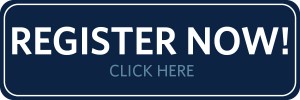UBC Division of OHNS – Alumni Social
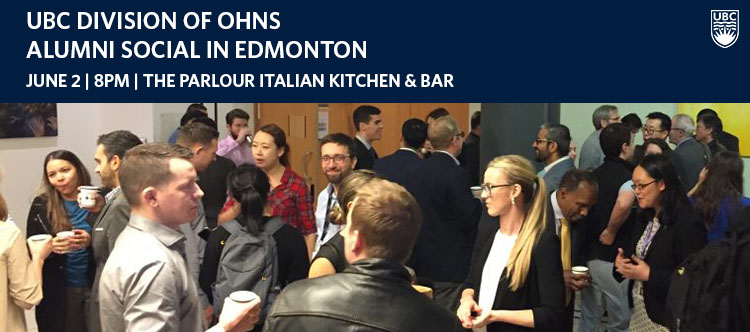
Attending the Canadian Society of Otolaryngology Head and Neck Surgery in Edmonton?
We invite you to join us at the Parlour Italian Kitchen & Bar for a social where you can meet up with fellow UBC alumni, colleagues, and friends. Come and hear from Dr. Desmond Nunez, Head, Division of Otolaryngology and Dr. Fred Kozak, President, Canadian Society of Otolaryngology while enjoying some food and beverages.
EVENT DETAILS
Sunday, June 2, 2019
8:00pm
The Parlour Italian Kitchen & Bar
10334 108 St NW, Edmonton, AB T5J 1L9
Note: There is no cost to attend this event. Your RSVP is requested by May 19, 2019.
Videsh Kapoor BSc’88, BEd (Sec)’92, MD’93
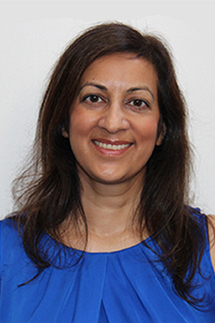
Dr. Videsh Kapoor is the 2019 recipient of the UBC Medical Alumni Association Silver Anniversary Award.
Dr. Kapoor is a Clinical Assistant Professor in the UBC Department of Family Practice and family physician practicing in Vancouver, Canada and completed all of her medical training at the University of British Columbia (UBC) in Vancouver. She is involved in numerous UBC Faculty of Medicine curriculum development and teaching activities, including Communication and Clinical Skills and family practice preceptorships, and most notably in establishing Global Health education programs for both undergraduate and postgraduate medical students.
Dr. Kapoor is the Director of the Division of Global Health in the Department of Family Practice and the Global Health Theme Leader in the Medical Undergraduate Program at UBC. She chaired the development of national consensus core global health competencies for medical undergraduate curricula in association with the AFMC (Association of Faculties of Medicine of Canada) and CFMS (Canadian Federation of Medical Students). In collaboration with the CFPC (College of Family Medicine of Canada) Global Health Committee, Dr. Kapoor is currently working on the development of core competencies in global health for Family Medicine Curricula. She is the Faculty Advisor for the UBC Medicine Global Health Initiative, which was co-founded by medical students and faculty and this novel program includes a series of workshops, several international projects, and curriculum development. Dr. Kapoor supervises and participates in four of these projects located in India, Kenya, Nepal, and Uganda. In 2016, she worked with students and community partners to launch the Refugee Health Initiative which pairs medical students with refugee families in the first year of their resettlement. She has also developed a sustainable partnership with a remote health centre in the Peruvian Amazon. She is also a member of the advisory board of the School of Journalism’s International Reporting Program.
In 2007, she was awarded Family Practice Teacher of the Year by the BC College of Family Physicians. She has been the recipient of a teaching excellence award from the Global Health Education Consortium (Velji Award) in 2010. In 2011, she was awarded by medical students the UBC Medical Undergraduate Society Dr. William Webber Award in recognition of her contribution to undergraduate medical education and commitment to the future physicians of British Columbia. In 2014, Dr. Kapoor was the recipient of the UBC Alumni Global Citizenship Award.
Michael Nimmo MD’95
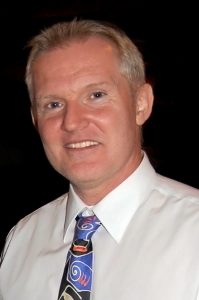
Dr. Michael Nimmo is a 2019 recipient of the UBC Medical Alumni Association Wallace Wilson Leadership Award.
Dr. Nimmo is the Clinical Associate Head in the University of British Columbia (UBC) Department of Pathology and Laboratory Medicine. He has been a member of the Department of Pathology and Laboratory Medicine and a Pathologist at the Vancouver General Hospital and Health Sciences Centre since 2000. Dr. Nimmo obtained his MD in 1995 and then went on to complete his General Pathology Residency, both at UBC. Prior to obtaining his medical training, Dr. Nimmo trained and practiced corporate law for several years.
Since his initial UBC Clinical Faculty appointment, Dr. Nimmo has demonstrated excellence through his dedication to academic activities, particularly teaching. His teaching activities are very extensive, spanning from the Bachelor of Medical Laboratory Science (BMLSc) Program within the Department of Pathology and Laboratory Medicine to the MD Undergraduate Program and to Clinical Integrated training for Residents. He has won several teaching awards, including the UBC Killam Teaching Award, the Dr. Melvyn Bernstein Resident Teaching Award, and the BMLSc Graduates’ Choice for teaching excellence.
Dr. Nimmo has been actively involved in education in the Department of Pathology and Laboratory Medicine, primarily in his roles as the General Pathology Residency Program Director for the last 16 years and the Executive Director of the Residency Program. Since 2015, he has also been serving as the Medical Undergraduate Program Director for the Department. His various other responsibilities have included: course director for Pathology 375; leader of multiple medical undergraduate small group sessions; supervisor of the UBC Department of Pathology Summer Student program; supervisor of fourth year electives for medical undergraduates; and lecturer within the undergraduate medical program. Dr. Nimmo also served as the Director of Clinical Faculty Affairs for the UBC Faculty of Medicine, from 2009-2015. More recently, he has served as the Chairman of the Faculty of Medicine Student Promotion and Review Board. Dr. Nimmo is also currently the President of the Vancouver Coastal Health Professional Association of Pathologists and the Division Head of Anatomical Pathology at Vancouver Coastal Health.
In his role as Clinical Associate Head, Dr. Nimmo helps foster all clinically focused and integrated educational programs within the Department. In addition, he works to ensure that departmental recruitments and academic activities are of the highest quality and are aligned with the strategic priorities of the provincial academic department, the UBC Faculty of Medicine, and UBC. In conjunction with site Heads, Dr. Nimmo will also ensure that the UBC Department of Pathology and Laboratory Medicine plays a leadership role in the development of clinical services and models of service delivery in the province and that clinically integrated research, including clinical applied and translational research is supported and fostered.
Ron Walls BSc’75, MD’79
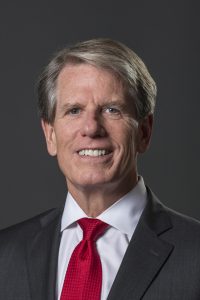 Dr. Ron Walls is a 2019 recipient of the UBC Medical Alumni Association Wallace Wilson Leadership Award.
Dr. Ron Walls is a 2019 recipient of the UBC Medical Alumni Association Wallace Wilson Leadership Award.
Dr. Walls is the Chief Operating Officer of Mass General Brigham, an $18B integrated academic health system that includes Massachusetts General Hospital and Brigham and Women’s Hospital. He is also the Neskey Family Professor of Emergency Medicine at Harvard Medical School. From 2015-2020, Dr. Walls was the Executive Vice President and Chief Operating Officer of Brigham Health. A native Canadian, Dr. Walls attended medical school at the University of British Columbia in Vancouver, Canada, and completed his residency training in Emergency Medicine at Denver General Hospital. He served on the faculty at George Washington University Medical Center and then as Associate Professor and Head of the Department of Emergency Medicine at Vancouver General Hospital.
From 1993 through 2014, Dr. Walls served as Chair of the Department of Emergency Medicine at Brigham and Women’s Hospital, and in 2006, he became the first emergency physician to achieve the rank of Professor at Harvard Medical School.
Dr. Walls’s principal academic contributions were in advancing emergency airway management. His research and teaching were major drivers of the widespread adoption of neuromuscular blocking agents for emergency intubations. In all, he has more than 180 scientific publications. Dr. Walls is editor-in-chief of Rosen’s Emergency Medicine, editor-in-chief for emergency medicine for UpToDate, and editor emeritus of the Walls Manual of Emergency Airway Management, now in its fifth edition. He has received major awards from all three emergency medicine specialty organizations and has served as visiting professor at more than 40 institutions.
Rachel Cliff, MSc’16
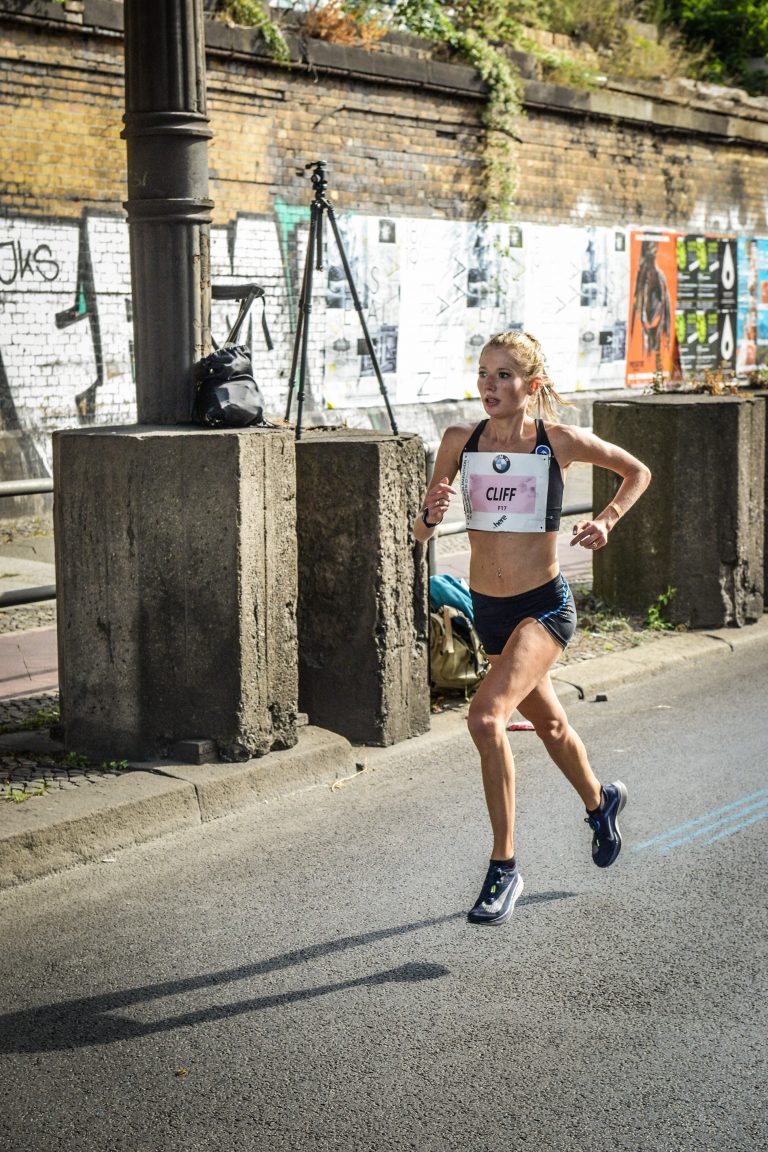
Photo: © sportograf
Rachel Cliff, MSc’16, is an elite long-distance runner, specializing in the 10,000 metres, half marathon, and marathon. She is currently focusing on qualifying for the Tokyo 2020 Summer Olympics.
Rachel enrolled in a toxicology elective in her second year of undergraduate study at the University of Guelph and was fascinated by the field, particularly the regulatory and human/public health aspect of it. The following semester, she switched her major from a B.Sc. in General Biology to one in Biomedical Toxicology.
She learned about the Masters in Occupational and Environmental Hygiene (OEH) program in the School of Population and Public Health at UBC during the final year of her undergraduate degree when she watched a seminar presentation by Dr. Paul Demers, one of the school’s founders. Rachel saw the OEH program as a way for her to expand the knowledge she gained in her undergraduate degree, with the general goal of improving public and occupational health by minimizing environmental exposures and striving to make workplaces safer.
After completing her Masters OEH program in 2016, Rachel worked for a year and a half as a research assistant at the Partnership for Work Health and Safety at UBC, before fully committing herself to long-distance running. Making that decision felt like a risk for Rachel. However, she knows there is a finite window in which to be at her athletic peak and she intends to make the most of it. In 2016, she narrowly missed qualifying for the 2016 Summer Olympic Games and described it as “heartbreaking.” After that experience, Rachel knew that she wanted to take her athletics to a professional level for a full Olympic cycle so she could put herself in the best possible position for the 2020 Summer Olympics in Tokyo.
During an average week Rachel runs between 70 and 90 miles – 2 to 3 of the runs are event-specific interval based workouts, and her additional training includes cross training and weight lifting at least twice a week, along with daily exercises that are assigned by her physiotherapist. While most of her runs are done in solitude along the Vancouver trails, she says distance running is anything but a solo sport. “Working closely with an expert, professional coach who acts as both a boss and a mentor, and training with a great group of teammates, who are both friends and competitors,” she says highlights the teamwork that goes into the sport. “I seek advice from physio and massage therapists, sports psychologists, human physiologists and sports medicine doctors. Vancouver is also a very active community with lots of available running routes, and I think because of that, there’s a very supportive running community here, which is fun to be a part of. The people I meet through the sport are one of my favourite parts of what I do.”
While acknowledging the challenging and constant state of fatigue training can bring, she describes that the best aspect of her athletic career has always been and continues to be the process. “Pushing your body to its limits is both an art and a science,” Rachel says. “In athletics, there are always new boundaries to push and ways to improve yourself. As a scientist, I like to think of it as ‘the ultimate science experiment’, albeit one where me, the athlete, is the research subject in a study with a sample size of one.” Approaching her training and racing with this in mind, she understands that every injury is an opportunity for her to learn about human anatomy, every poor workout or race is a chance to learn about human physiology or psychology and address a weakness, and every long run is an opportunity to understand about nutrition and proper fueling.
Rachel travels frequently internationally, often as an unattached athlete, but at times representing Canada on numerous occasions. “There are few things as special as putting on your nation’s singlet and walking to the start line to compete at the world stage,” she says, “Especially when you know you are in peak physical fitness. Every year my goals seem to get bigger and I know I likely won’t achieve them all, but I love the feeling of accomplishment when a new one is reached.”
Some of her notable athletic achievements to date include running the Canadian record in the half marathon in March 2018 (1:10:08), qualifying for the World Championships in 2017 and placing 20th (time: 32:00.03), running the fastest debut marathon by a Canadian in 2018 in Berlin (2:28:53), and running the Olympic standard in the 5000m in 2016.
An item on her bucket list is to visit every continent in the world, with just Antarctica left on her list. Citing the difficulty in running there, Rachel says she will likely complete that goal after her running career. With her determination and grit, it will be exciting to see what is in store for her next career.
Nancy Cho, BSc (Rehab) ’82
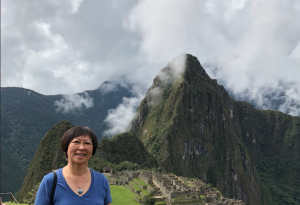
Nancy Cho, BSc (Rehab) ’82, is the Physiotherapy Practice Lead – Professional Practice Allied Health at Vancouver Coastal Health and the 2018 alumni UBC Alumni Builder Award recipient. Learn more about Nancy in her Q&A below!
Describe what you do at your workplace in two or three sentences.
I provide professional practice leadership to 400 physiotherapists and rehab assistants at Vancouver Coastal health across the continuum of care: acute, rehab, community home health, mental health, and residential. Along with my team I ensure safe, competent physiotherapy services by mentoring front line staff and developing best practices in physical therapy. VCH covers geographically Richmond, Vancouver, North Shore, sea to sky corridor, sunshine coast, and the Bellas.
What led you to choose to study and practice physiotherapy?
Originally, I was looking to pursue a degree in pharmacy. When a friend introduced me to the rehab medicine program at UBC, I found it resonated with me. I was looking for a career that was people oriented and supported the well-being of people and rehab medicine was the perfect fit! I graduated with a combined degree in physiotherapy and occupational therapy and appreciate this dual education which I believe enriches my approach to provide the best possible client care.
What is the best professional advice you’ve received?
You will not succeed at all your challenges but always intently observe, listen, and learn from others – don’t sweat the small stuff.
What’s the biggest risk you’ve taken to date?
Taking a leap of faith, after finishing my MBA, I started looking for a job to use my new found skills and in 1994 changed jobs from VGH Physio Section Head in the Intensive Care Unit to a Clinical Practice Lead position for Physiotherapy in Vancouver Home Health, a role I held for 18 years.
What are the best aspects of your career?
Being a leader in my profession and having the opportunity to be a role model leading, teaching and mentoring others.
What are the most challenging aspects of your career?
Managing pessimism and building morale.
What is one question you’re often asked about your career?
“I’m in pain right here, can you fix me?”
And as a mentor, “how did you get to where you are now, can you help me”?
What advice would you give to current PT students?
Aim first to be a ‘well rounded’ physiotherapist, by consolidating a broad range of knowledge and skills in your first 1-2 years to allow you to keep all future options open, don’t specialize too soon.
Please name a few of your favourite hobbies and activities.
Travelling, gardening, hosting dinner parties, volunteering, hiking, long walks, and cycling.
Name something that is on your bucket list. Have you completed it?
Creating another alumni bursary for PT students (yes) + a trip to Galapagos Islands and Africa (soon!).
Today in healthcare it’s important to…
educate our patients, clients and residents, including their families to monitor, maintain, and improve their health status and quality of life.
Nancy Cho, BSc (Rehab) ’82
A summary… to date!
Volunteering
- UBC alumni activities for the past 36 yrs – rehab representative for alumni divisions, resource for Department of Physical Therapy fundraising, bursary development, reunions, etc.
- UBC Dept. of Physical Therapy clinical associate professor teaching and various committees throughout the years
- Canadian Alliance of Physiotherapy Regulators for 27 years: as a Provincial member and then Chair of National Written Exam committee
- CPTBC (College of Physical Therapists of BC) for 36 yrs: Board member, chair of various committees (Communications, Finance, Quality assurance program, Registrant competency assessment, Patient Relations, Transfer of Function)
- BC Physiotherapy Leadership Council – chair for the past 8 yrs, member 25 yrs.
- Shaughnessy Heights United Church Council Chair for last 4 years and many other committees
Work
- Vancouver Coastal Health – 36 years @ VGH – 12 yrs
- Vancouver Community Home Health x 18yrs
- Regional Professional practice x 6 yrs
Awards
- UBC 75th anniversary award (1992)
- PABC Leadership Award of Excellence (2009)
- CPA Leadership Division Award (2016)
- Canadian Alliance of Physiotherapy Regulators Award of Distinction (2017)
- PABC Professional Contribution Award of Excellence (2017)
- alumni UBC Alumni Builder Award (2018/2019)
Thomsen D’Hont
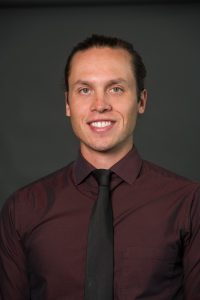 Thomsen D’Hont is a 3rd year UBC medical student, cross country skier, and passionate about culturally competent and good healthcare for Indigenous peoples. Read our Q&A to learn more about Thomsen’s passion for medicine and what he hopes to achieve upon graduation.
Thomsen D’Hont is a 3rd year UBC medical student, cross country skier, and passionate about culturally competent and good healthcare for Indigenous peoples. Read our Q&A to learn more about Thomsen’s passion for medicine and what he hopes to achieve upon graduation.
What are you currently studying?
I am a 3rd year medical student at the Northern Medical Program in Prince George.
Describe what you like about studying where you do.
One of my favourite things about studying in Prince George is the work-life balance. The cross country ski trails and mountain bike trails are easily accessible for mid-week exercise. I am also able to get around town on foot or by bike for nearly all my transportation needs, further simplifying life.
What led you to choose to study medicine?
Medicine’s combination of science and humanities has appealed to me for a long time. More recently, I have learned of the shortage of Indigenous healthcare providers in Indigenous communities and this has further motivated me to become a physician in an under-served community in the NWT.
What do you consider your greatest achievement to date?
Competing in the World Cup of cross country skiing in 2012.
Please list a few of your current volunteer positions, past job positions, appointments and/ or awards received.
For volunteering, I am on the board of directors for the Arctic Indigenous Wellness Foundation, the winner of the $1 million Arctic Inspiration Prize in 2018. I am also a volunteer coach with the local Prince George cross country ski racing team. Recent paid work has involved a summer student position last year with the Northwest Territories Health and Social Services Authority researching emergency department surge and evaluating emergency medical travel.
Further, I have also recently worked as a research assistant at the Institute for Circumpolar Health Research in Yellowknife where I conducted a needs assessment for a territorial Indigenous wellness centre and did research into maternity care delivery in the circumpolar North.
Last year I also completed a two-year fellowship called the Jane Glassco Northern Fellowship, a public policy and leadership program with the Walter & Duncan Gordon Foundation, where I wrote a policy paper on how the Northwest Territories can address the need for Indigenous physicians in the territory.
What is the best advice you’ve received?
A lot of the best advice I have received doesn’t stand out in terms of specific things that were said, but more so in terms of the spirit of encouragement in the words from my mentors and how empowered I felt afterwards. To be a bit more specific, I think some of the more memorable advice I have received is to make sure I advance in my education and career in a stepwise fashion, making sure to accumulate a good base of knowledge and experience before taking on new roles that are more demanding. Another piece of advice that really sticks out in my mind was from an Indigenous leader and advocate in Ontario who told a group of us Indigenous students that it doesn’t matter how long it takes us to get our degrees, we just have to get the degrees. It seems simple, but I think a lot of people in the room, including myself, could derive their own significance from that quote.
What is your favourite UBC memory so far?
Recently, I was in the OR with a husband-wife duo, one of whom is Canada’s first female First Nations General Surgeon and is a force of nature for Indigenous health and the other is an ER doc and Olympic gold medalist. They are both integrated in the Prince George community in various roles and I coach their teenaged daughter in skiing. It was a moment that seemed rooted in a lot that I stand for: providing culturally competent and good healthcare for Indigenous people, while also prioritizing community-involvement and athletic achievement. It was a neat feeling of being in awe while also feeling totally comfortable around them based on our similar interests and similar field of work.
What is the biggest risk you’ve taken to date?
I am a pretty risk-averse person and wouldn’t say I take many risks. My mom would say I put myself at risk every time I go mountain biking or skiing alone in the bush. I also tend to do a lot of winter road trips for skiing, so I suppose driving on snowy roads is also fairly risky.
What advice would you give to those thinking of studying medicine?
I have a lot of advice for those considering medicine! One of my passions is mentorship. I especially try to mentor those who might not have easy access to mentors in the medical field, so I encourage anyone who thinks they fit that demographic to reach out to me on Facebook or Twitter.
What profession might you have pursued, if not for medicine?
Full-time hunter/trapper and traditional knowledge expert.
Please name a few of your favourite hobbies and activities.
Cross country skiing, mountain biking, road biking, fat biking, hunting, fishing, camping, and drinking good cappuccinos and IPA.
Name the last book you couldn’t put down.
“Endure” by Alex Hutchinson. I find exercise physiology and endurance sport fascinating and there are few authors who can weave this together with stories of real-life athletes.
Name something that is on your bucket list. Have you completed it?
To race some of the big ski loppets in Scandinavia, such as the 90 km Vasaloppet in Sweden.
What do you look forward to upon graduation?
Reintegrating with communities in the NWT. Being away from the NWT for education sacrifices my community connection and my development of traditional skills, such as hunting and traveling in the bush.
Have you thought about what you will pursue after you have completed your MD?
I am pretty set on being a GP in the NWT and in working with under-served communities.
Today in healthcare it’s important to…
Indigenize healthcare institutions and to dismantle power structures within these institutions that limit access to care for those who need it most.
Nancy Cho, BSc (Rehab)’82
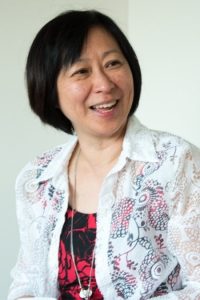 Knowing that we’re stronger together, a small group of UBC’s first graduates formed alumni UBC on May 4, 1917. Now we’re more than 337,000 strong, spanning over 148 countries.
Knowing that we’re stronger together, a small group of UBC’s first graduates formed alumni UBC on May 4, 1917. Now we’re more than 337,000 strong, spanning over 148 countries.
The Alumni Builder Awards were established as part of alumni UBC 100, the alumni association’s centennial, to recognize alumni who, in their own way, have made important contributions to the success of UBC and its alumni community. The awards are presented by alumni UBC on the recommendation and in partnership with UBC’s faculties, advisory councils, and other leadership groups.
We are pleased to announce our Alumni Builder Award 2018 recipient is Nancy Cho, BSc (Rehab)’82.
Please join us in recognizing Nancy for her dedication to education and furthering the practice of physiotherapy, and many years of volunteer service to the Faculty of Medicine.
Tuum Est!
In all, 13 Alumni Builders are being recognized this year. A complete list of recipients can be found at www.alumni.ubc.ca.
Maryam Zeineddin BSc’98, MD’03
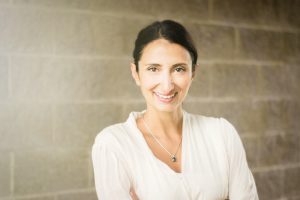 Dr. Maryam Zeineddin, BSc’98 MD’03, is a family practice physician and the chair of Zili, a not for profit organization that promotes and supports preventative health initiatives in Canada and across the globe.
Dr. Maryam Zeineddin, BSc’98 MD’03, is a family practice physician and the chair of Zili, a not for profit organization that promotes and supports preventative health initiatives in Canada and across the globe.
After completing her undergrad, MD, and family practice residency in Vancouver, Dr. Zeineddin opened a full service medical centre in Vancouver. During the course of her practice she began searching for a way to continue to educate her patients in their own preventative health care. By increasing education, you can increase ownership of your own health.
Dr. Zeineddin’s work with her own patients led her to see a bigger purpose, to bring Canadians the right information and create a movement: the education of prevention. Zili was born of this desire to “promote evidence-based preventative health information from local family physicians, specialists and allied health care professionals”. Zili Health’s vision is to bring a digital platform for a more global reach.
In June 2017, the first Zili Women’s Preventative Health Conference was held in Vancouver BC. The conference, which features a forum and interactive sessions, brings together 300 patients, physicians, and allied healthcare professionals for a full day women’s preventative healthcare. Speaker topics from the past two conferences include aging parents, relationships with food, avoiding and screening for the top four chronic conditions, meditation, parenting resilient kids, and the truths and myths of cosmetic surgery.
When asked to look back on her time as a student at UBC, Dr. Zeineddin fondly recalls establishing a Red Cross Club to raise funds for earthquake victims and her involvement with intramural sports. An avid player of Hockey, Basketball, Soccer, and Ultimate, she credits participating in intramurals during her studies with bringing her balance and at the same time maintaining a focus on healthy living and medicine.
In addition to her work as a family physician and chair of Zili, Dr. Zeineddin is a clinical instructor for UBC Family Practice and acknowledges that her greatest achievement is that she is still healthy with 2 beautiful children, a loving husband, and an exceptional support system.
You can learn more about Zili and their mission at www.zilihealth.com
